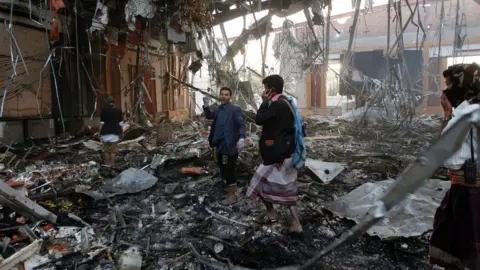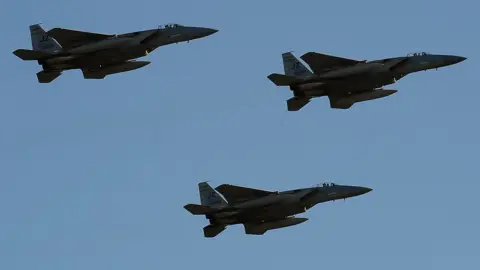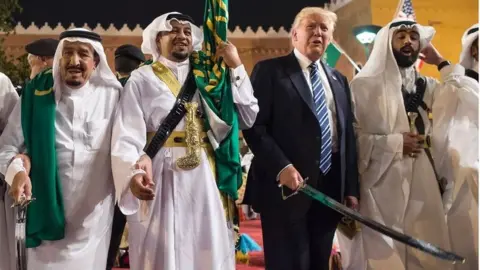Trumplomacy: Is there a Mideast strategy beyond arms sales?
 AFP
AFPFrom now on the US can go back to selling precision-guided missiles to Saudi Arabia despite its poor record of avoiding civilian casualties in the Yemen conflict.
The state department has lifted a hold that Barack Obama had put on the sale after the Saudi-led coalition bombed a funeral reception, apparently by mistake, killing more than 100 people.
The state department argued that the precision munitions could improve Saudi targeting, and lawmakers had 30 days to review the reversal. They did come unusually close to blocking it, but time's run out.
The bigger question is whether this administration has a strategy for the Middle East beyond flooding it with weapons.
Arms sales were the centrepiece of President Donald Trump's recent visit to Saudi Arabia. He said his $110bn (£87bn) deal would create American "jobs, jobs, jobs" and help the Saudi-led bloc of Sunni countries battle so-called Islamic State (IS) and confront Iran.
 Getty Images
Getty ImagesKeeping up the tempo, the defence secretary last week signed a $12bn-deal to sell F-15 fighter jets to Qatar.
But that's a bit confusing because Saudi Arabia & Co have accused Qatar of funding terrorists and slapped it with a severe economic and diplomatic boycott, with President Trump cheering them on.
Proxy wars
The bottom line, though, is that the Sunni states are not going to use these weapons against Iran directly.
Yes, deterrence and defence are a big part of the military build-up, but the active use of arms will be in messy proxy wars like the one in Yemen.
Which brings us back to the precision-guided missiles.
A resolution of disapproval for the sale was only narrowly defeated in the Senate, 47-53, showcasing growing unease among lawmakers.
There's concern over potential American complicity in possible violations of international humanitarian law, in a conflict that's plunged the country into famine.
It was an unprecedented outcome for a proposed weapons sale to what most senators accept is a strategic ally, albeit one that has its own problematic relationship with an extremist form of Islam.
We saw the beginnings of resistance in September with a similar motion to block a sale of battle tanks to Saudi Arabia, but that was soundly defeated.
 AFP/Getty Images
AFP/Getty ImagesThe worsening situation in Yemen has changed the minds of some Senate Democrats.
So has the Trump factor.
Chris Murphy, one of the sponsors of the resolution, noted that Barack Obama sold more weapons to Saudi Arabia than all previous presidents combined.
But Mr Obama also curtailed Riyadh's fight for regional dominance and sought to rein in Iran's ambitions with political and diplomatic solutions.
President Trump, on the other hand, is "definitively taking the Sunni side of the broadening set of proxy wars between the Saudis and the Iranians", said Sen Murphy, which is "deeply harmful to US national security".
Strings attached?
Others talked about the apparent disconnect between the desire to sell more arms in the region, and an articulated strategy on ending the conflicts there.
"It's very confusing to world leaders and members of Congress when the Trump administration does two exactly opposite things" on Qatar, Democratic Congressman Ted Lieu said at a recent congressional hearing on foreign weapons sales.
Rex Tillerson's latest statement only accentuates the differences: he questioned whether the embargo was triggered more by longstanding political disputes with Qatar than by concerns about its support for terrorism.
Whatever the case, the closeness of the Saudi vote was a shot across the bow for Riyadh, which denies it's primarily responsible for the civilian casualties in the battle against Iran-backed Houthi rebels.
US officials say no conditions were attached to the munitions sale.
Nevertheless someone conveniently leaked to the New York Times a letter from the Saudi foreign minister detailing new safeguards that sound a lot like conditions.
And, as part of the $110bn Saudi arms deal, the state department has approved a training programme contract aimed partly at helping prevent accidental killings of civilians.
The rest of the package could take years to clear its way through congress, bit by bit, since much of it is actually letters of intent for future sales.
Watch for more action from the Senate Resistance. Another of the resolution's sponsors, Republican Rand Paul, has vowed continued opposition to "fuelling an arms race in the Middle East".
And watch also for another Obama-era leftover: the state department has lifted his block on F-16 fighter jets to Bahrain, which in this case did come with specific human rights conditions. That's expected to land in Congress soon.
